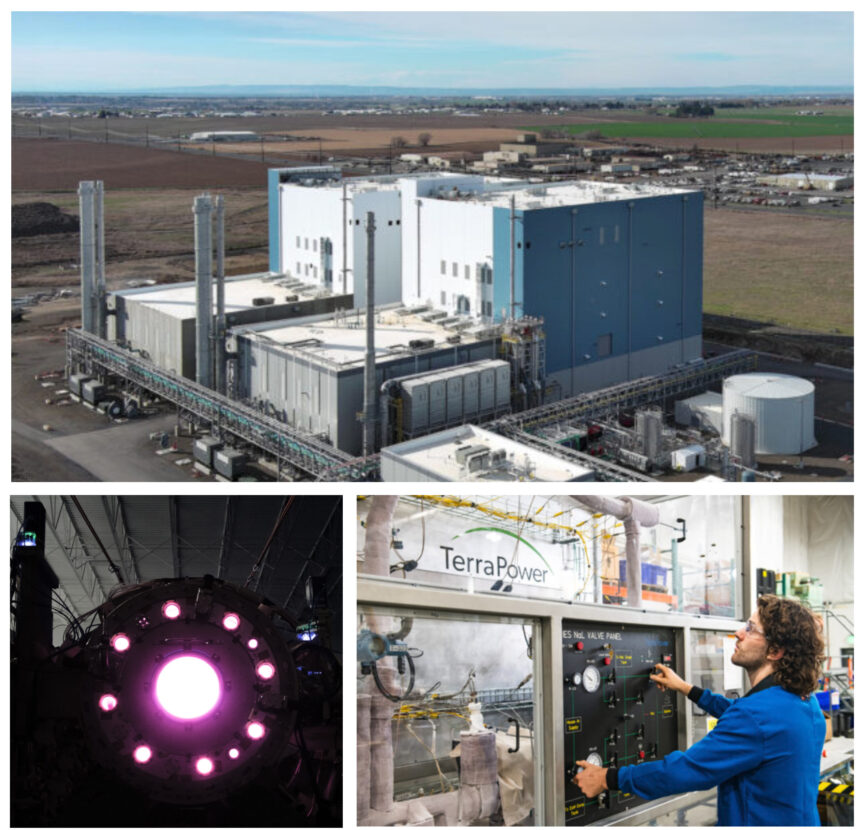The three biggest investments so far this year in Pacific Northwest companies have gone to businesses working to decarbonize the economy.
- TerraPower, a company co-founded by Bill Gates, raised $650 million for its next-gen, small modular nuclear reactors. Investors included Gates, NVIDIA’s venture capital arm, and HD Hyundai, which builds ships.
- Group14 Technologies, which is producing silicon-anode battery materials, announced $430 million of new funding to support manufacturing facilities in Eastern Washington and South Korea.
- Helion Energy landed $425 million to help fund its fusion innovations and construction of its first commercial reactor, located in Eastern Washington.
Clean energy, climate and sustainability tech companies netted nearly 40% of investment dollars in 2025 across the region, according to GeekWire’s funding tracker, which includes more than 125 rounds so far this year.
It’s a surprising trend.
- Climate tech and clean energy are not typically the darlings of the venture capital world given their hardware capital costs and the need for long time horizons before any shot at profitability.
- The sector has grown less certain this year as the White House and Republican-led Congress claw back support for these efforts and tariffs threaten to drive up costs.
- The field was further rattled last week when the Trump administration halted a nearly completed offshore wind-power project in Rhode Island.
But investors offer numerous reasons for the surge in support of climate tech companies in the Pacific Northwest.
Reuven Carlyle, founder of the corporate strategy and investment firm Earth Finance, said that venture capitalists and companies in the region believe the world is moving toward decarbonization and that demand for clean energy will keep growing. With that mindset, investing and innovating in this space make sense.
“No one is minimizing the challenge and the chaos of this moment…. but there is a long game,” Carlyle said. “And the DNA of the Seattle high-tech community is separating the signal from the noise for the long game.”
Karin Kidder, executive director of the Seattle-based climate investment group E8 Angels, joined Carlyle in pointing to the urgent need for new energy as a key driver of the funding. Tech giants such as Amazon and Microsoft are scrambling to secure clean electricity to power their ever-expanding AI operations.
“Right now investors are especially interested in areas like energy storage, grid and distributed solutions, and sustainable materials, because they are solving urgent market needs and have strong potential for scale,” Kidder said.
The support for clean energy and climate technologies in the Pacific Northwest diverges from what’s happening nationwide.
After a blockbuster year for U.S. climate companies in 2021, investments dropped by roughly half in 2023 and stayed there in 2024, totaling nearly $14 billion each of those years, according to PitchBook data. So far this year, venture capitalists have invested around $8 billion in the sector.
Pacific Northwest companies — which include businesses in Washington, Oregon, British Columbia and Idaho — have raised more than $2 billion in 2025, which is nearly three times the amount of capital netted last year.
Carlyle, who is a former state senator, said that pro-climate public policy on the West Coast, combined with a concentration of international companies pursuing ambitious carbon-reduction goals — including Amazon, Microsoft, Starbucks, Boeing and T-Mobile — helps sustain interest in climate startups even when facing challenging odds.
“There is a willingness to embrace the risk at this moment,” he said.
Supportive policies in Washington include the Climate Commitment Act, which charges emitters for their carbon pollution; requirements for producing clean power in the state; and building efficiency standards, among others.
Kidders pegs the Pacific Northwest as a climate tech and investment hot spot for additional reasons, including “the talent and ideas coming out of our universities, a growing pool of investors, real corporate commitment, and historic state support,” she said. “That mix makes it a place where founders can start and scale quickly with access to a diverse mix of capital.”
That said, many of the top-funded climate tech companies in the region face serious hurdles to their success and essential uncertainties remain: Will fusion technologies generate sufficient power? Can small modular reactors pencil out? Will the U.S. build a robust domestic battery industry?
With climate companies actively deploying their technologies — Helion broke ground this summer for its first reactor and TerraPower recently announced progress on its nuclear facility in Wyoming — answers to those questions are coming soon.
Read the full article here










